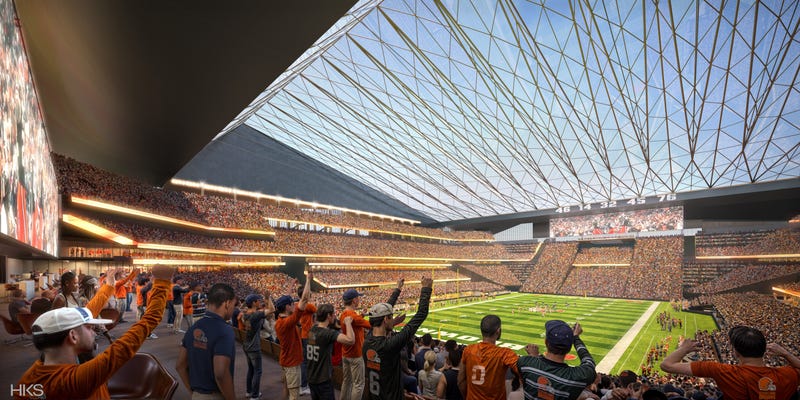
CLEVELAND, Ohio (92.3 The Fan) – With the city of Cleveland threatening to sue the Browns over a potential move to Brook Park in 2029 by invoking the ‘Modell Law,’ the team has taken the city to court.
The Browns filed suit against the city of Cleveland in United States District Court, Northern District of Ohio, Thursday in which they are asking the ‘Modell Law’ be declared “unconstitutional on its face and as applied to the Browns, or in the alternative finding that the Browns’ intention to develop a domed stadium in the City of Brook Park, Ohio, and, after the expiration of its current lease obligations, play its home games at that site, does not trigger or violate the requirements of” it.
In the 20-page filing, the Browns contend that upon fulfillment of the team's lease with the city of Cleveland following the 2028 NFL season at Huntington Bank Field on the lakefront, the team and city both are under no obligation to renew the lease; the Browns are under no obligation to continue to use the stadium; and taxpayer funds would no longer be used or required for the stadium beyond expiration of the lease meaning the application of the 'Modell Law' by the city of Cleveland is improper.
“Throughout our future stadium planning process, we have always acted transparently and in good faith with the City of Cleveland and are disappointed in the City’s latest course of action stating its intent to bring litigation regarding the "Modell Law,” Browns chief operating officer David Jenkins said in a statement. “These statements and similar actions create uncertainty and do not serve the interests of Greater Cleveland. Therefore, today we have filed a lawsuit seeking clarity on this vague and unclear law.
“As we have consistently conveyed, the intent of our future stadium planning has always been to work in collaboration with our local leaders to find the optimal long-term stadium solution that will benefit our fans while positively impacting our region. Our lease expires at the end of the 2028 season, and we are working hard to develop a long-term solution upon completion of our current agreement.
“Today’s action for declaratory judgment was filed to take this matter out of the political domain and ensure we can move this transformative project forward to make a new domed Huntington Bank Field in Brook Park a reality. We have no interest in any contentious legal battle but are determined to create a project that will add to Greater Cleveland by building a dome stadium and adjacent mix-used development, a $3-3.5B project, that will include approximately $2B in private investment. This project will bring premier events and economic activity that will generate significant revenue for the City, County and State. As this is now an ongoing legal matter, we will have no further comments. We look forward to a positive resolution.”
The Modell law, Section 9.67 of the Ohio Revised Code enacted in June of 1996, places restrictions on owners of professional sports teams that uses a tax-supported facility and was crafted in response to Art Modell moving the original Browns to Baltimore where they became the Ravens in 1996.
“No owner of a professional sports team that uses a tax-supported facility for most of its home games and receives financial assistance from the state or a political subdivision thereof shall cease playing most of its home games at the facility and begin playing most of its home games elsewhere unless the owner either:
(A) Enters into an agreement with the political subdivision permitting the team to play most of its home games elsewhere;
(B) Gives the political subdivision in which the facility is located not less than six months' advance notice of the owner's intention to cease playing most of its home games at the facility and, during the six months after such notice, gives the political subdivision or any individual or group of individuals who reside in the area the opportunity to purchase the team.”
The ruling on this legal action filed Thursday by the Browns will clarify if Cleveland can block the Browns move to Brook Park.
